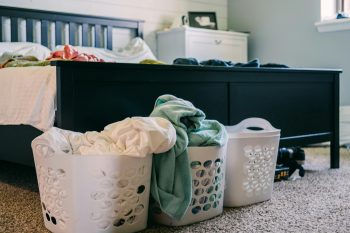A clutter-free life is about so much more than tidy surfaces and organized spaces. When we clear out the physical, mental, and digital clutter, we make room for things that truly matter—whether it’s fostering creativity, reducing stress, or finding more joy in the everyday. Here’s your comprehensive guide to decluttering each aspect of your life and reaping the rewards.

Pexels
ALSO SEE: Tips for navigating the holidays on a budget
Why decluttering matters
Decluttering isn’t just about creating a clean space; it’s about creating a clear mind and a streamlined life. The benefits of an organized environment and a focused mindset are extensive, impacting everything from mental well-being to productivity and relationships. Here’s why decluttering your home, mind, and tech are essential steps towards a more intentional and peaceful life.
1. Reduces stress and anxiety
Clutter, whether in your home or on your device, is visually and mentally overwhelming. Studies show that a cluttered environment can raise stress hormones, which can lead to anxiety and negatively affect your mood. When you take the time to organize and clear out unnecessary items, you’ll likely feel a calming sense of control and relief.
2. Improves focus and productivity
Too much clutter, particularly in your workspace or on your devices, competes for your attention, making it harder to focus. A clear space and a digital environment free of distractions help you concentrate on the tasks that matter most, improving productivity and making each day more fulfilling.
3. Better decision-making
Mental clutter and physical chaos can make even small decisions feel overwhelming. By decluttering, you eliminate unnecessary choices and distractions, freeing up mental energy to make clear, thoughtful decisions in all areas of life.
4. Enhances well-being and mindfulness
A cluttered environment can create a sense of chaos and stress, whereas an organized one supports mindfulness and a positive outlook. Decluttering your home, mind, and digital life creates space for things that bring joy, connection, and peace, fostering a more fulfilling daily experience.
Decluttering your home: Room-by-room checklist

Pexels
A cluttered home often leads to a cluttered mind, but decluttering every room can seem overwhelming. Break it down with this room-by-room checklist for maximum impact without the stress.
Entrance hall
- Remove unused shoes: Keep just one or two pairs by the door for daily use; store the rest in a closet.
- Limit outerwear: Store out-of-season coats and scarves to reduce visual clutter.
- Designate a space for keys and bags: A small tray or hook system prevents items from piling up on tables.
Kitchen
- Clear out expired foods: Check the pantry, fridge, and freezer for expired or unwanted food items.
- Simplify your cooking tools: Keep the essentials—if you haven’t used that special appliance or kitchen gadget in months, consider donating it.
- Organize drawers and cabinets: Group similar items together, and use dividers to keep things neat.
Lounge
- Minimize decorations: Keep surfaces clear by choosing a few statement pieces instead of a crowded collection.
- Sort through magazines and books: Donate or recycle old magazines and consider which books you’re likely to read again.
- Tidy up electronics and cords: Use cord organizers or hidden storage for charging cables and remotes.
Bedroom
- Sort through your wardrobe: Donate clothes that don’t fit, are worn out, or don’t suit your style anymore.
- Declutter your bedside table: Limit items to a lamp, a book, and maybe a small plant or essential item.
- Organize under the bed: If you use this space for storage, keep it organized with bins to avoid a chaotic buildup.
Bathroom
- Discard expired toiletries and makeup: Old products not only take up space but can also be bad for your skin.
- Reduce backup supplies: Limit the number of backup shampoos, soaps, and lotions to avoid clutter.
- Contain small items: Use baskets or trays to corral smaller items like cotton balls and razors.
Decluttering your mind

Pexels
Decluttering your mind is just as important as organizing your physical space. Overwhelming mental clutter can affect your focus, motivation, and peace of mind. Here’s a checklist to help you clear your thoughts and prioritize what matters.
Set boundaries on information intake.
- Limit news consumption: Choose specific times to check the news, so it doesn’t consume your entire day.
- Clean up your social media feed: Unfollow or mute accounts that add stress or negativity. Focus on following accounts that bring joy, inspiration, or education.
- Prioritize quality over quantity: Avoid information overload by sticking to a few reliable sources rather than endlessly scrolling.
Practice mindfulness
- Try deep breathing exercises: Even a few minutes of deep breathing can help centre your mind and reduce stress.
- Journal regularly: Writing down your thoughts is a great way to “declutter” your mind. Even a few lines a day can help you clear mental fog.
- Schedule downtime: Make time for relaxation and allow yourself to take breaks without feeling guilty.
Streamline your commitments
- Say no more often: Overcommitment leads to mental clutter. Prioritize what truly aligns with your values and goals.
- Set daily intentions: Instead of a long to-do list, choose 1-3 things you want to accomplish each day. This makes tasks feel more manageable and rewarding.
- Review your goals: Regularly review what’s most important to you and make adjustments to your priorities as needed.
Decluttering your digital life

Pexels
Our devices are where much of our modern clutter lives—emails, files, apps, and notifications. A regular tech declutter reduces stress, saves time, and makes your digital life more efficient.
Organize your phone
- Delete unused apps: Only keep apps you use, and organize them by category or function for easy access.
- Turn off notifications: Only keep essential notifications to reduce distractions and give you back control over your time.
- Declutter your photo library: Go through your photo gallery and delete duplicates, blurry shots, or anything you don’t want to keep. Consider creating albums for easier organization.
Clean up your computer.
- Organize your desktop: A cluttered desktop can feel overwhelming. Group similar files, or use folders to keep everything tidy.
- Delete old files: Go through your downloads folder, documents, and any other file storage areas to delete what you no longer need.
- Sort bookmarks and shortcuts: Keep only frequently used bookmarks or shortcuts, and categorize them for easy access.
Inbox management
- Unsubscribe from unwanted emails: Use tools like Unroll.Me or manually unsubscribe from mailing lists that clutter your inbox.
- Create folders and rules: Automatically sort incoming emails by creating folders and filters for newsletters, work emails, and personal messages.
- Archive or delete old emails: Don’t let years’ worth of emails sit around—archive or delete anything you no longer need.
Manage cloud storage
- Organise cloud files: Set up folders for each type of file—work, personal, photos, etc.—to make them easier to find.
- Delete unnecessary files: Free up space by deleting files that you don’t need or have duplicates of on your computer.
- Review sharing permissions: Regularly check which files you’re sharing with others, and remove access if it’s no longer needed.
ALSO SEE:
Brain gym: Try these hand movements to boost your coordination
Featured Image: Pexels

